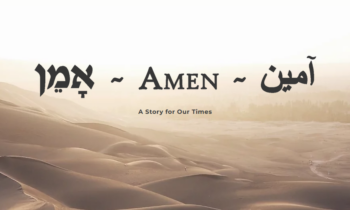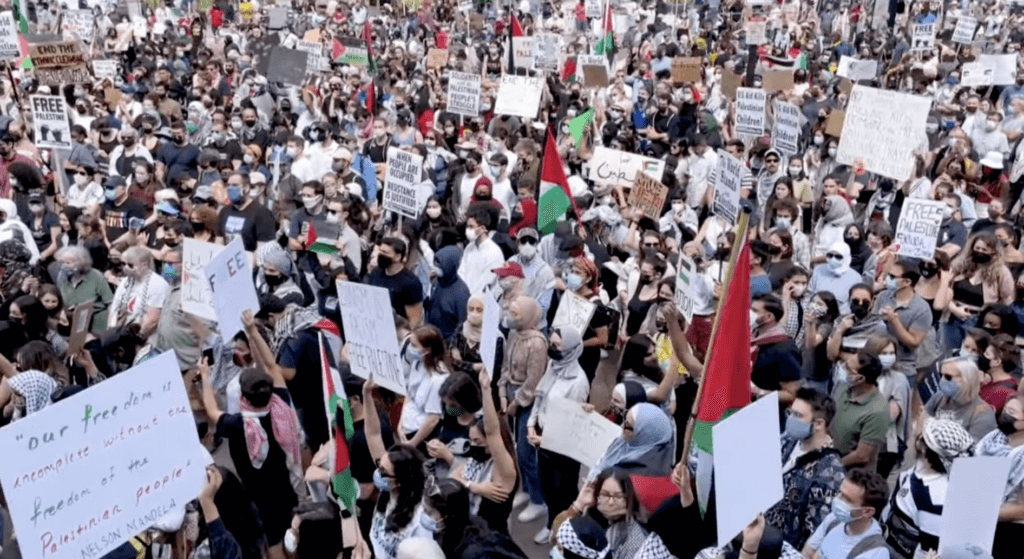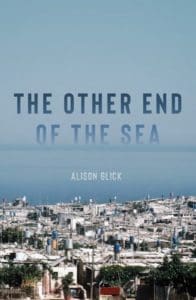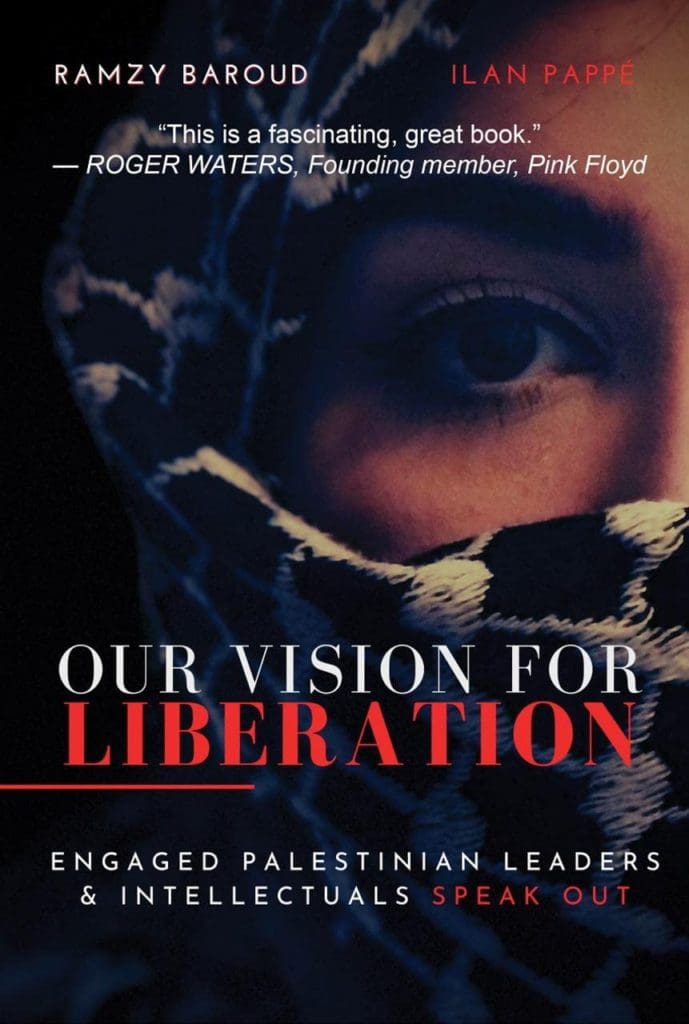This article explores deception in this PBS-hosted documentary promoting UAE-Israel relations at the expense of Palestinians. It was first published by Fairness and Accuracy in Reporting.
WNET, the PBS station distributing the 2021 documentary feature Amen-Amen-Amen: A Story of Our Times, called it
the story of the first Jewish community formed in a Muslim country in centuries (in Dubai), and a historic gift of a Torah scroll dedicated to the memory of an Arab-Muslim ruler, the late Sheikh Zayed, the founding father of the United Arab Emirates.
The Boston Globe featured Amen-Amen-Amen in its documentary events program, GlobeDocs. The Globe hosted filmmaker Tom Gallagher of Religion Media Company in conversation with Loren King on March 14.
The film has an attractive premise—that the United Arab Emirates is a champion of religious tolerance, exemplified by the establishment of a Jewish community in Dubai. This is presented as so historically significant (presumably because the Arab Muslim world is otherwise hostile to Jews) that the Jewish community decided to gift a Torah scroll in honor of Sheikh Zayed, the deceased founding father, to his son Sheikh Mohamed bin Zayed Al Nahyan, crown prince of Abu Dhabi and deputy supreme commander of the UAE armed forces.
Despite the stamp of credibility provided by the Boston Globe and PBS, and the film’s ten international documentary awards, anyone familiar with current Israel/UAE relations will wonder how a film with such obvious political interests is seen as a documentary rather than pure propaganda.
Dubious champion of tolerance
“The United Arab Emirates is an oasis of tolerance,” announces a voiceover at the beginning of the film. Amen-Amen-Amen features the February 2019 visit by Pope Francis to the UAE for the much publicized Year of Tolerance, which attracted a diverse crowd of 180,000 people. This visit, and a signed document on human fraternity, are further presented as evidence of the UAE as a champion of religious tolerance.
The crown prince is described on camera as “a humble man” with “exquisite” communication. One describes meeting him as “a spiritual experience.”
The film also notes that the UAE is “very diverse,” as 90% of people in the UAE are not Emirati, and uses this fact to conclude that ““there is no way that the UAE cannot be inclusive.” It’s such a glowing portrait of the country that viewers might be surprised to know that the conservative nonprofit Freedom House rates it “not free,” ranking it below countries like Egypt, Russia and Qatar in terms of political rights and civil liberties.
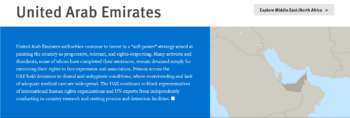
The country’s diversity springs not from a commitment to tolerance but from the UAE’s dependence on imported workers. Human Rights Watch calls the “tolerance narrative” of the UAE a sham, and concludes:
United Arab Emirates authorities continue to invest in a “soft power” strategy aimed at painting the country as progressive, tolerant and rights-respecting. Many activists and dissidents, some of whom have completed their sentences, remain detained simply for exercising their rights to free expression and association. Prisons across the UAE hold detainees in dismal and unhygienic conditions, where overcrowding and lack of adequate medical care are widespread. The UAE continues to block representatives of international human rights organizations and UN experts from independently conducting in-country research and visiting prisons and detention facilities.
In 2020, Amnesty International and dozens of other human rights organizations issued an open letter (2/24/20) calling the UAE “a country that does not tolerate dissenting voices” and arguing that “the UAE government devotes more effort to concealing its human rights abuses than to addressing them and invests heavily in the funding and sponsorship of institutions, events and initiatives that are aimed at projecting a favorable image to the outside world.”
A 2020 report by the Carnegie Endowment for International Peace explored whether, despite some reforms, the UAE migrant policy is akin to human trafficking.
Of course, Amen-Amen-Amen doesn’t mention any of these critiques that contradict the image it wishes to portray. In fact, in the Boston Globe–sponsored discussion of the film, filmmaker Tom Gallagher squirmed out of an audience question about human rights violations in the UAE by saying the film sticks strictly to the issue of religious pluralism and intentionally stayed away from geopolitical analysis.
Hidden political motivation
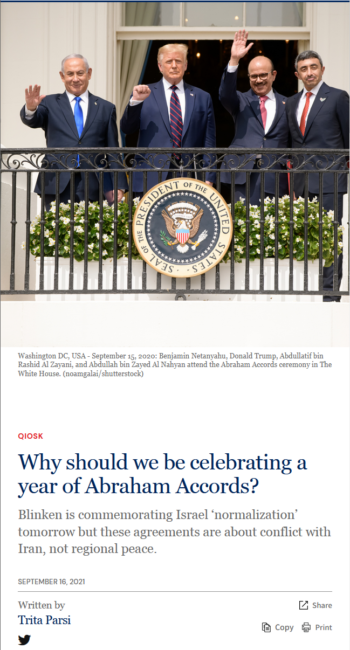
But the relationship between the UAE and its Jewish residents can’t be fully understood without geopolitical context—including the country’s changing relationship with Israel. The Abraham Accords, a series of US-sponsored treaties first signed in September 2020, normalized diplomatic relations between Israel, the UAE, Bahrain, Morocco and Sudan, formalizing long-term relationships that were previously covert. The bedrock of the Abraham Accords is a military alliance against Iran, though the UAE also benefits from direct access to US weapons, and there are huge opportunities for profit from new regional trade. Also important, the Abraham Accords officially break what was at least rhetorical opposition by Arab countries to Israeli violations of Palestinian rights, and expand the bloc of countries in alliance with Israel’s governing right wing.
The Abraham Accords have been and will continue to be extremely profitable for Israel and the UAE, both financially and militarily. At least $11 billion has been made available by the UAE for investment in Israel. The Rand Corporation, proponents of the Accords, concluded its 2021 report:
If these new relations evolve into deeper economic integration, we estimate that the economic benefits for Israel’s partners in this endeavor could be particularly significant, creating approximately 150,000 new jobs for just the four current signatories. This number could grow to more than 4 million new jobs, and more than $1 trillion in new economic activity over a decade, if the accords grow to include 11 nations (including Israel), as some have speculated may be possible.
Though it might not be immediately obvious, enhanced arms sales to the UAE, valued in the tens of billions, are tied up with, not contradictory to, the US commitment to Israel’s military superiority. In other words, both the US and Israel benefit from the increased militarization of Israel’s allies, especially given their shared interest in opposing Iran. And it is in the interest of the UAE, Israel and the US to rewrite the narrative they spun about terrorist Arabs into a good Arab/bad Arab story, with the UAE being “good guys” who will get political props for making nice with Israel.
Much is made in the film and its marketing materials about the Jewish community in Dubai being the “first Jewish community formed in an Arab-Muslim country in centuries,” implying that Muslim countries have not been friendly to Jews until now. But the film also goes into detail (13:00–15:00) about a time when there was “relative harmony, warm social relationships, neighborhood relationships, business relationships, intellectual exchanges” between Jews and Muslims over centuries, into the twentieth century. So which is it?
It’s true that Jews have been an integral part of Arab Muslim communities for many hundreds of years, and faced much less discrimination than in Christian Europe. The main rupture that occurred—which is conspicuously not mentioned in the film—was not a religious rupture between Arab Muslims and Jews, but a political rupture between Arab countries and the state of Israel over the position that Palestinians have rights, and should not be exiled, occupied and colonized.
Presenting the warming relationship between the UAE and its Jewish population without explaining any of the political context suggests that the more hostile relationship between the UAE and Israel that preceded it was simply due to antisemitism, rather than a political stance against Israeli colonization and occupation of Palestinian land.
In this overarching context, the release of a film that offers an entirely uncritical and glowing portrait of the UAE ought to make PBS take a closer look at the film’s funding.
Questionable funding
FCC guidelines require broadcasters to “fully and fairly disclose the true identity” of all broadcast program funders,” including original production funders.
Amen-Amen-Amen‘s funders, however, are difficult to fully discern. It is the sole project of Religion Media Company (RMC), which appears to be essentially a one-man outfit run by Tom Gallagher. Gallagher is the former head of Religion News Service and has no apparent training or previous experience as a filmmaker. Although RMC was registered as a nonprofit public charity in 2021, there are no publicly available financial documents showing its sources of income, nor does it have a website listing its board of directors.
According to the film’s website, Gallagher “conceived of the documentary” in 2018 and founded RMC in January 2020—after the events shown in the film—to produce “original media projects that tell powerful stories of our common search for meaning, wherever those stories are found.”
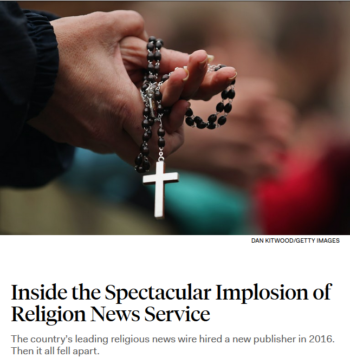
The New Republic (4/27/18) called Gallagher’s short reign at Religion News Service a “spectacular implosion.” A highly regarded religion writer cited “irreconcilable differences” with him, after one journalist was fired and others left in protest. Religion Dispatches (6/19/18) reported that Gallagher was subject to widespread criticism for a “pro-Catholic bias,” considered ethically compromising in interdenominational publishing.
Notably, sources at RNS told the blog Get Religion (12/11/19) “that Gallagher had barely stepped into his position three years ago when he flew off to Abu Dhabi to talk with a moneyed sheik about some kind of RNS collaboration; as in the staff providing content for the United Arab Emirates Ministry of Tolerance.” His exit from RNS would have been just around the time that Gallagher took on the producing, writing and directing of Amen-Amen-Amen.
In terms of outside funders, several names are listed on the film’s website as executive producers—a title given to those who fund a film—with Marc Bell, an NYU trustee, given top billing. At least one other executive producer, James Deutsch, has ties to NYU. Deutsch was, at the time of filming, a trustee of elite Manhattan prep school the Trinity School alongside former NYU president and central Amen figure John Sexton; Deutsch has since become an NYU Law trustee.
Sexton himself plays a pivotal role in the film as the person who introduced directly to Sheik Mohamed the idea of the Torah gifting; he was also present at the gifting ceremony and interviewed in the film. Sexton was the founder of NYU Abu Dhabi, which is fully funded by the UAE. The film’s credits give “a special thanks” to “the inestimable John Sexton and his team of Nancy Gessner, Dan Evans, Elizabeth Cheung-Gaffney, Emily Daughtry and Catherine DeLong” and note that “the film would not have been possible without John Sexton’s overall leadership.” The only other people given special thanks are seven UAE government officials, including Sheik Mohamed. While special thanks do not always imply a transfer of money, this roster raises questions about conflicts of interest.
Essential individuals
PBS funding standards aim to “protect its credibility and integrity by ensuring the editorial independence of all content from funders.” In the case of Amen-Amen-Amen, questions should be asked about the individuals and organizations that appear essential to the film’s production. Moreover, the constellation of relationships among funders, participants, those featured in the film and their political and economic interests are complex, and raise suspicions about editorial independence.
In fact, numerous individuals associated with NYU are given thanks in the film credits, including:
- Nancy Gessner, administrative manager of NYU
- Dan Evans, chief of staff and deputy to the president at NYU
- Elizabeth Cheung-Gaffney, instructor and administrator at NYU Shanghai
- Emily Daughtry, preceptor of Sheikh Mohamed bin Zayed Scholars, NYU/ Abu Dhabi
- Catherine DeLong, associate vice chancellor & CFO at NYU/Abu Dhabi
- Sara Aeder, director of development of NYU’s Bronfman Center for Jewish Student Life, as well as the staff of the Bronfman Center
- Emily Hirsch, formerly senior brand strategist at NYU
- Tracy Lavin, director of community and education engagement, NYU/Abu Dhabi
- Eric Hilgendorf, an employee of NYU/Abu Dhabi
In addition, Cheung-Gaffney and DeLong received credits as “legal” and “accounting and financial” for the film, respectively. Both worked directly under Sexton at the time in similar capacities for the Catalyst Foundation for Universal Education, which Sexton founded and directed.
Yehuda Sarna, another prominent figure in the documentary, is the executive director of the NYU’s Bronfman Center for Jewish Student Life, who simultaneously serves as chief rabbi of the Jewish Council of the Emirates (and is a public proponent of the Abraham Accords).
The large role that NYU staff and trustees played in the film raises questions about the film’s financial relationship with the school and potential conflicts of interest.
Also featured in the film is Eli Epstein, identified as an “interfaith activist” and American businessman, with the idea of the gifting of the Torah. Epstein is also listed as an executive producer, which indicates he not only stars in the film but also helped fund it.
In the film, Epstein alludes to his decades of business activities in the UAE; he is currently chief innovation officer at the aluminum company Aminco Resources, and he was the founder and CEO of Calco, a partner of Conoco Oil. Epstein currently also runs a US-registered nonprofit organization, Visions of Abraham, which “provide(s) our clientele with a one-stop-shop for individually curated group tours to two of the world’s most popular destinations.” Its website also says:
Recently, our team has adopted a common goal of maximizing the historic potential of the Abraham Accords by making it as easy as possible for Jewish and Israeli groups of all sizes and denominations to explore the UAE and Bahrain firsthand.
Amen-Amen-Amen filmmaker Tom Gallagher said he didn’t take any money from the UAE government, but the funding sources of the UAE-based Muslim Council of Elders, which is thanked in the credits, are not transparent, and are very likely to include government funding. And as noted, NYU/Abu Dhabi, many of whose employees are credited by the film, is a project fully funded by the UAE.
In other words, the film appears to have been funded or otherwise made possible by the same people who are featured in the film, and who also have economic and political interests in the narrative advanced by the film.
If it looks like a duck
In light of its funders and collaborators, it’s dubious to view Amen-Amen-Amen as simply a celebration of religious tolerance. It makes more sense to read it as a performative film that seeks to promote the UAE’s and Israel’s political interests in normalization, as well as the interests of NYU.
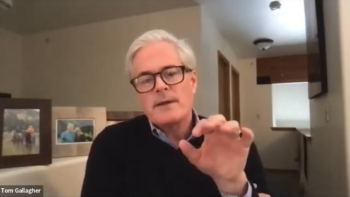
The manipulation of the film and its backers is very well done and consistent. For example, in the filmmaker talk sponsored by the Boston Globe, Gallagher stressed that Jews in Dubai who descended from Holocaust survivors were especially moved by the UAE’s welcome. He said, “So many come to this with the horrific history of the Holocaust and persecution, and they see that they can actually be accepted.” An uninformed viewer might find this poignant, except that Arabs and Muslims had nothing to do with the Holocaust.
But the filmmakers mince no words when they tout their own importance. In a discussion in Amen-Amen-Amen among Epstein, Sarna and Elie Abadie, senior rabbi of the Jewish Council of the Emirates, they call the events featured in the film a “landmark.” They call it “an anchor in a way that could redefine the terms of civilization.” This is a powerful claim, to say the least—one that the film does little to justify.
While there isn’t a strict or agreed upon definition of “documentary,” among the general public the word tends to evoke the idea of objectivity. Given how close expository documentaries might be to propaganda, it is surprising that there are no industry standards for evaluating films branded as documentaries; and each promoter is left to develop and enforce their own guidelines.
After several inquiries, the Boston Globe answered my question about selection criteria and due diligence simply by saying, “We often have filmmakers reach out and pitch us their ideas and their films throughout the year to screen during our GlobeDocs monthly screenings—that was the case for this film.”
WNET also didn’t provide details, but told me: “All of our programs are carefully vetted to ensure that they meet broadcast standards and represent community needs. Vetting includes funding, content, and other production standards.”
In fact, it is not clear how Amen-Amen-Amen complies with the standards of any media organization that claims to be nonpartisan. The problems include the absence of context that would inform an understanding of the political motivations of the film, several questions about the integrity of the story and production, and lack of clarity about the transparency and independence of funding for the film. The dubious credibility of this “documentary” ought to give pause to discerning viewers and lead them to look more deeply at the Abraham Accords and those who profit from them. Hopefully, the gatekeepers like PBS and the Boston Globe who lift up films making politically-interested claims can also learn to comply with their own standards, which are necessary to ensure public trust.
